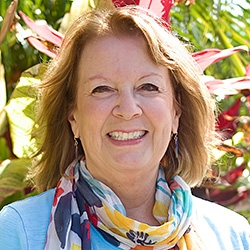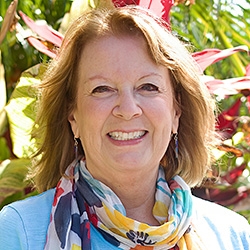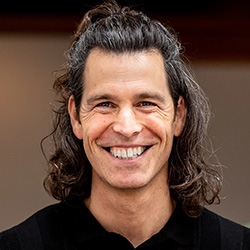

Search Results: change
-
Hello,
I’m Iris Bawidamann. When Mary reached out to me asking if I’d write this letter, I sat for some time meditating on what is alive for me and what I want to share with you… This is what surfaced for me… Fear sits with me—on my shoulders, in my chest. A familiar presence I consciously keep in check so it doesn’t take over. Watching global politics, conflicts, and rising polarization, I often feel overwhelmed. The world is shifting.
-
-
- Wish you knew how to align your organization with its purpose and values?
- Want to increase your capacity to live in integrity with your values, too?
- Concerned about the level of engagement within your organization?
- Yearn to connect to a sense of meaning in your life during this time of global crises?
- Long to discover what is yours to do – and wish you knew how to leverage the resources you have in response to what is needed?
-
Trainer Tip: Sometimes the expression of our needs can sound like demands or criticism. This can make it harder for people to want to contribute to us. Today, pay attention to how you express your needs. Find ways to release the emotional charge.
-
Roxy Manning shares some strategies to support a child's natural curiosity when asking questions about physical differences using NVC skills.
-
It’s essential to give ourselves time to grapple with the complex feelings surrounding the brutality of state-sanctioned racism and violence. But if all we do is reflect and attend to our emotions we fail to show up, where and when it counts. So let's not perpetuate the violence by standing idly. Instead, here's ten things you can do to move into concrete action to address the continued, untenable, and horrific violence of racism. A list of resources is included.
-
In a workshop, a hesitant white neurodivergent man faced a triggering reaction from a Global Majority transgender man. Uncovering their backgrounds, the facilitator addressed family dynamics and exclusion. A repair exercise fostered empathy, challenging assumptions and emphasizing the importance of equitable facilitation for a richer group experience.
-
-
- Gain a new, surprising, and exciting connection to yourself that will enable you to both deepen the sense of power in your life and actualize everything you've always dreamed of…
- Experience being fully present in the world — despite your habits — so that you'll always be connected to your inner center and thus be able to choose at any given moment where to take your life…
- Understand how to create within yourself (and others!) a sense of flow and love, making your life much more beautiful and exciting…
- Learn how to open up in your relationships in ways you never thought would be possible, creating an entirely different closeness and intimacy in your life…
-
Experience a deep process of self-connection and meaningful self-discovery.
-
-
Trainer tip: The phrase “tragic expressions of unmet needs” is used to convey how often we do things that aren’t likely to meet our needs. It’s not bad, it’s tragic -- because it won’t help us meet our needs. Acknowledging this, we can then consider a different approach that's more likely to lead to satisfying results. Read on for three examples of where this may apply in your life.
-
When we feel pain about humans relate to, and conflict with, one another on Earth what can give us capacity to transform it? Perhaps in connection to the formless consciousness of unity we may relax, open, expand -- and connect to formless human needs, a sense of universal well being, benevolence and good will. Loving action flows from here. Suffering shifts into deep healing, grace and new possibility.
-
- Adapted from Marshall’s bestselling book and taught in his own words
- Learn how to utilize empathy to safely confront powerful emotions
- Discover how to overcome the blocks to compassion
- Open to your natural desire to enrich the lives of those around you!
-
- Learn how every decision we make perpetuates the status quo or brings us closer to the vision of a world that works for all
- Find out about our big brain capacity to integrate needs, impacts, and resources to make decisions that work for everyone
- Understand why power differences interfere with collaborative decisions and what can be done about it
- Discover tools that support collaboration in larger groups and organizations— even across power differences!
-
In June, 1996, I had an epiphany. In a motel room in Indiana, the night before returning home from a solo camping trip in Michigan and Canada, I discovered how much I had lost in my life because of so fiercely protecting myself. Up until that day, bringing forth my vulnerable self was to be avoided at all costs, which kept me numb much of the time, disconnected from myself and from much of life. Alone in my room, I cried, I talked out loud, and I finally exclaimed to myself that I wanted to reclaim every last bit of my vulnerability, just like I had it as a child.
-
- Start here to discover how Nonviolent Communication (NVC) will enrich and deepen all your relationships.
- You'll love this practical and enlightening approach to empathic listening and effective self-expression.
- Learn on your schedule with self-paced learning modules in this 30-day program.
-
Robert's passion was in the spirituality of the Nonviolent Communication (NVC) process. He saw NVC both as a process that helps people connect more authentically with themselves and others, and as a spiritual practice and way of living. The worldwide NVC community mourned when Robert died in 2021. He left behind a legacy of work that emerged from a lifetime of inquiry into the intersection between spirituality and human communication.
-
- Learn how to use empathy to dissolve conflict
- Deepen your NVC skills to help let go of judgments
- Explore approaches for asking for what you want
- Listen to the conflict within yourself
-
Quick Links

Stay in Touch!
We value your privacy, won't share your email address and you can easily unsubscribe any time.

















